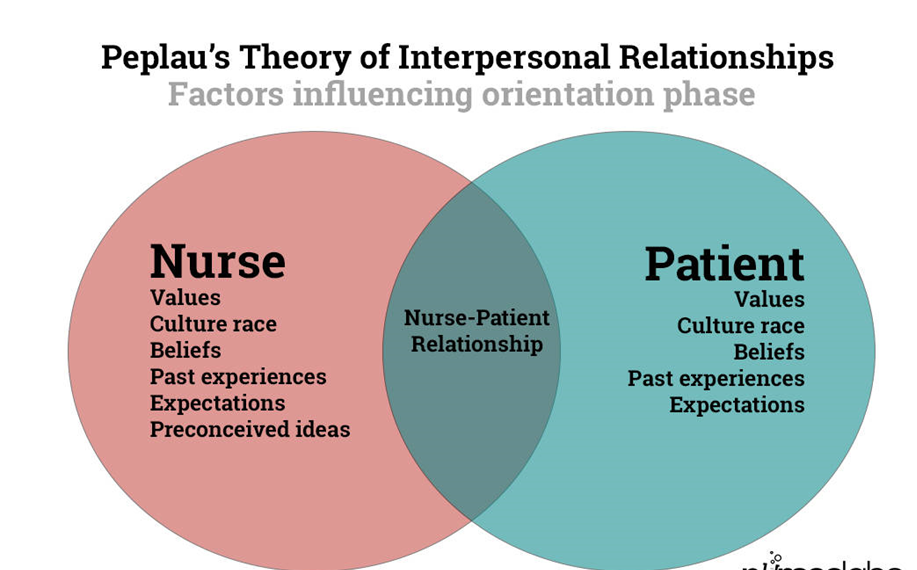Peplau's Interpersonal Theory of Nursing:
Select one:
Limited the role of the nurse to medication administration and documentation
Included both an interpersonal theory and a definition of nursing roles
Depended on moral theory linked to gender
Defined the role of the nurse in the mental health setting as an extension of the psychiatrist
The Correct Answer is B
Choice A Reason:
Limited the role of the nurse to medication administration and documentation is inappropriate. Peplau's theory goes beyond medication administration and documentation. It emphasizes the interpersonal aspect of nursing, focusing on the therapeutic relationship between the nurse and the patient.
Choice B Reason:
Included both an interpersonal theory and a definition of nursing roles is appropriate. Peplau's Interpersonal Theory of Nursing focuses on the nurse-patient relationship and includes both an interpersonal theory and a definition of nursing roles. Peplau emphasized the importance of the nurse's therapeutic use of self in the relationship with the patient.
Choice C Reason:
Depended on moral theory linked to gender is inappropriate. Peplau's theory is not specifically linked to moral theory or gender. It is more focused on the dynamics of interpersonal relationships in the healthcare context.
Choice D Reason:
Defined the role of the nurse in the mental health setting as an extension of the psychiatrist is inappropriate. While Peplau's theory is applicable to mental health settings, it doesn't define the role of the nurse as merely an extension of the psychiatrist. It highlights the nurse's unique role in building therapeutic relationships and assisting patients in their psychosocial needs.

Nursing Test Bank
Naxlex Comprehensive Predictor Exams
Related Questions
Correct Answer is D
Explanation
Choice A Reason:
Formulating a nursing diagnosis is incorrect. This occurs after a comprehensive assessment of the patient's needs, and it helps guide the planning and implementation of nursing care.
Choice B Reason:
Planning for continued care is incorrect. Once the nursing diagnosis is formulated, the nurse can develop a plan of care, including interventions and goals for the patient.
Choice C Reason:
Promoting patient's insight is incorrect. This is a part of the ongoing therapeutic process and involves helping the patient gain self-awareness and understanding of their thoughts, feelings, and behaviors. It typically occurs after the initial assessment and planning.
Choice D Reason:
Examining personal biases is correct. In the nurse-patient relationship, examining personal biases is a foundational and essential step that should happen first. It involves the nurse being self-aware and acknowledging any personal biases or prejudices that might affect the therapeutic relationship. Recognizing and addressing personal biases is crucial for providing unbiased and patient-centered care.
Correct Answer is A
Explanation
Choice A Reason:
Demonstrate genuineness when communicating is correct. Establishing therapeutic relationships in mental health nursing involves demonstrating genuineness, empathy, and trustworthiness in communication. Genuineness involves being authentic, sincere, and honest in interactions with clients. It fosters a sense of trust and connection, which is essential for the therapeutic relationship.
Choice B Reason:
Focusing on the words of the clients is incorrect. While it's important to listen actively to clients, effective communication goes beyond just focusing on words. Nonverbal cues, emotions, and the overall context of communication are also crucial.
Choice C Reason:
Providing sympathy during interactions is incorrect. Sympathy involves feeling sorry for someone, which may not always be helpful in a therapeutic relationship. Empathy, where the nurse understands and shares the client's feelings, is generally more therapeutic.
Choice D Reason:
Controlling the pace of establishing the nurse-client relationships is incorrect. The establishment of therapeutic relationships is a collaborative process, and attempting to control the pace might hinder the development of trust. It's important to be responsive to the client's needs and preferences.
Whether you are a student looking to ace your exams or a practicing nurse seeking to enhance your expertise , our nursing education contents will empower you with the confidence and competence to make a difference in the lives of patients and become a respected leader in the healthcare field.
Visit Naxlex, invest in your future and unlock endless possibilities with our unparalleled nursing education contents today
Report Wrong Answer on the Current Question
Do you disagree with the answer? If yes, what is your expected answer? Explain.
Kindly be descriptive with the issue you are facing.
